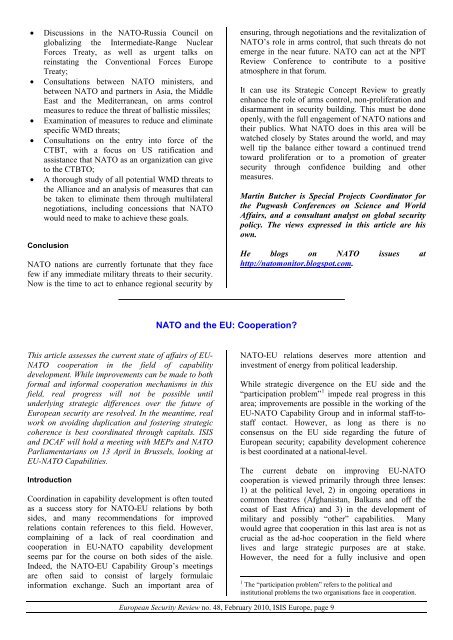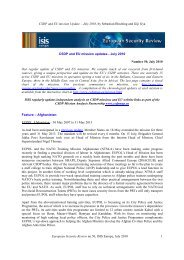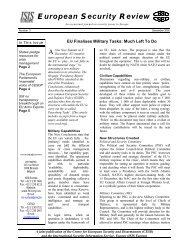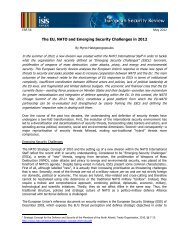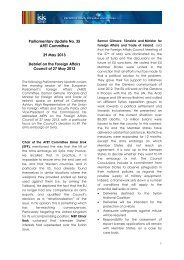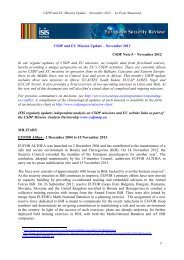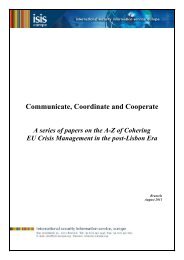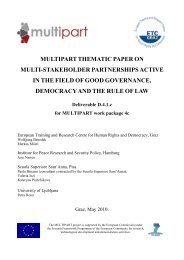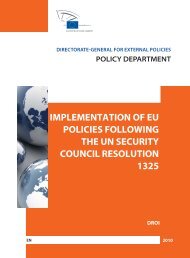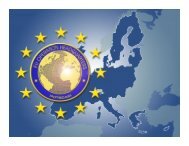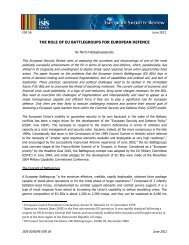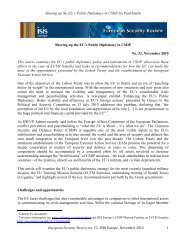ISIS Europe News In This Issue
ISIS Europe News In This Issue
ISIS Europe News In This Issue
Create successful ePaper yourself
Turn your PDF publications into a flip-book with our unique Google optimized e-Paper software.
• Discussions in the NATO-Russia Council on<br />
globalizing the <strong>In</strong>termediate-Range Nuclear<br />
Forces Treaty, as well as urgent talks on<br />
reinstating the Conventional Forces <strong>Europe</strong><br />
Treaty;<br />
• Consultations between NATO ministers, and<br />
between NATO and partners in Asia, the Middle<br />
East and the Mediterranean, on arms control<br />
measures to reduce the threat of ballistic missiles;<br />
• Examination of measures to reduce and eliminate<br />
specific WMD threats;<br />
• Consultations on the entry into force of the<br />
CTBT, with a focus on US ratification and<br />
assistance that NATO as an organization can give<br />
to the CTBTO;<br />
• A thorough study of all potential WMD threats to<br />
the Alliance and an analysis of measures that can<br />
be taken to eliminate them through multilateral<br />
negotiations, including concessions that NATO<br />
would need to make to achieve these goals.<br />
Conclusion<br />
NATO nations are currently fortunate that they face<br />
few if any immediate military threats to their security.<br />
Now is the time to act to enhance regional security by<br />
ensuring, through negotiations and the revitalization of<br />
NATO’s role in arms control, that such threats do not<br />
emerge in the near future. NATO can act at the NPT<br />
Review Conference to contribute to a positive<br />
atmosphere in that forum.<br />
It can use its Strategic Concept Review to greatly<br />
enhance the role of arms control, non-proliferation and<br />
disarmament in security building. <strong>This</strong> must be done<br />
openly, with the full engagement of NATO nations and<br />
their publics. What NATO does in this area will be<br />
watched closely by States around the world, and may<br />
well tip the balance either toward a continued trend<br />
toward proliferation or to a promotion of greater<br />
security through confidence building and other<br />
measures.<br />
Martin Butcher is Special Projects Coordinator for<br />
the Pugwash Conferences on Science and World<br />
Affairs, and a consultant analyst on global security<br />
policy. The views expressed in this article are his<br />
own.<br />
He blogs on NATO issues at<br />
http://natomonitor.blogspot.com.<br />
NATO and the EU: Cooperation?<br />
<strong>This</strong> article assesses the current state of affairs of EU-<br />
NATO cooperation in the field of capability<br />
development. While improvements can be made to both<br />
formal and informal cooperation mechanisms in this<br />
field, real progress will not be possible until<br />
underlying strategic differences over the future of<br />
<strong>Europe</strong>an security are resolved. <strong>In</strong> the meantime, real<br />
work on avoiding duplication and fostering strategic<br />
coherence is best coordinated through capitals. <strong>ISIS</strong><br />
and DCAF will hold a meeting with MEPs and NATO<br />
Parliamentarians on 13 April in Brussels, looking at<br />
EU-NATO Capabilities.<br />
<strong>In</strong>troduction<br />
Coordination in capability development is often touted<br />
as a success story for NATO-EU relations by both<br />
sides, and many recommendations for improved<br />
relations contain references to this field. However,<br />
complaining of a lack of real coordination and<br />
cooperation in EU-NATO capability development<br />
seems par for the course on both sides of the aisle.<br />
<strong>In</strong>deed, the NATO-EU Capability Group’s meetings<br />
are often said to consist of largely formulaic<br />
information exchange. Such an important area of<br />
NATO-EU relations deserves more attention and<br />
investment of energy from political leadership.<br />
While strategic divergence on the EU side and the<br />
“participation problem” 1 impede real progress in this<br />
area; improvements are possible in the working of the<br />
EU-NATO Capability Group and in informal staff-tostaff<br />
contact. However, as long as there is no<br />
consensus on the EU side regarding the future of<br />
<strong>Europe</strong>an security; capability development coherence<br />
is best coordinated at a national-level.<br />
The current debate on improving EU-NATO<br />
cooperation is viewed primarily through three lenses:<br />
1) at the political level, 2) in ongoing operations in<br />
common theatres (Afghanistan, Balkans and off the<br />
coast of East Africa) and 3) in the development of<br />
military and possibly “other” capabilities. Many<br />
would agree that cooperation in this last area is not as<br />
crucial as the ad-hoc cooperation in the field where<br />
lives and large strategic purposes are at stake.<br />
However, the need for a fully inclusive and open<br />
1 The “participation problem” refers to the political and<br />
institutional problems the two organisations face in cooperation.<br />
<strong>Europe</strong>an Security Review no. 48, February 2010, <strong>ISIS</strong> <strong>Europe</strong>, page 9


